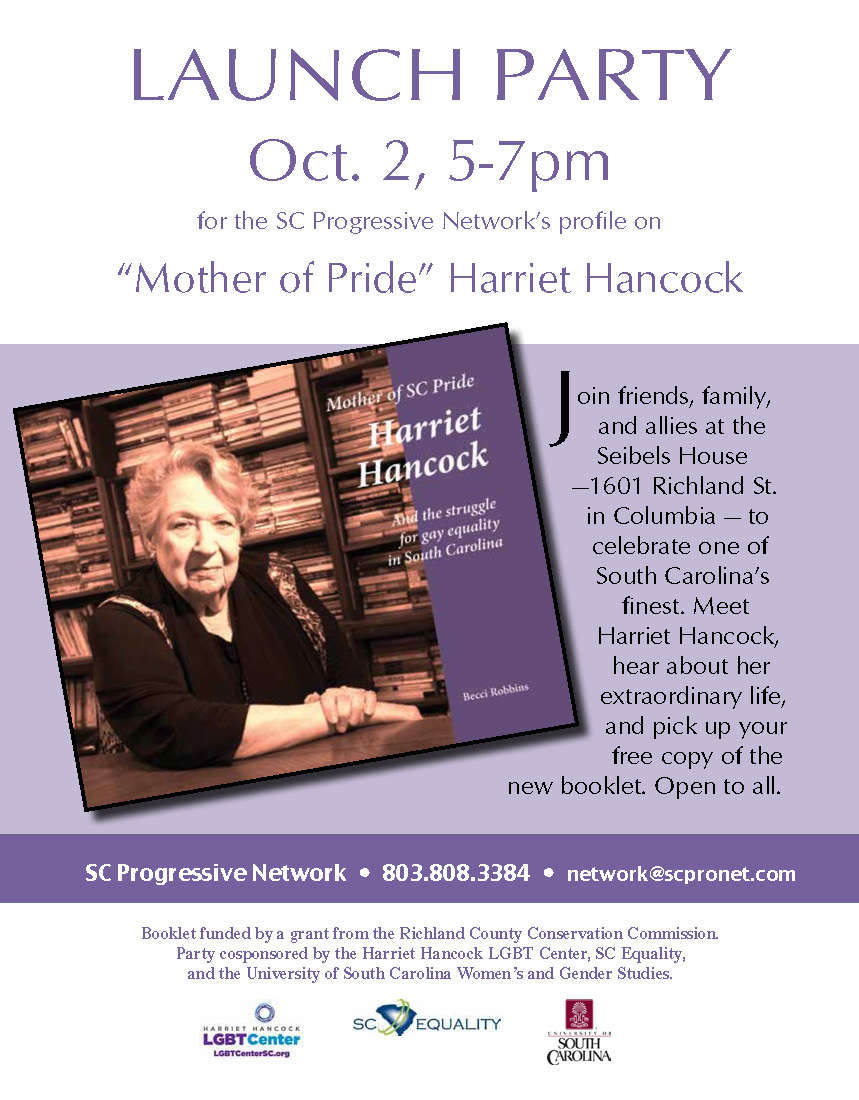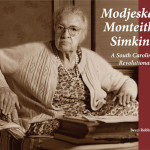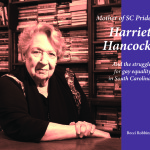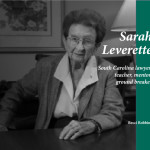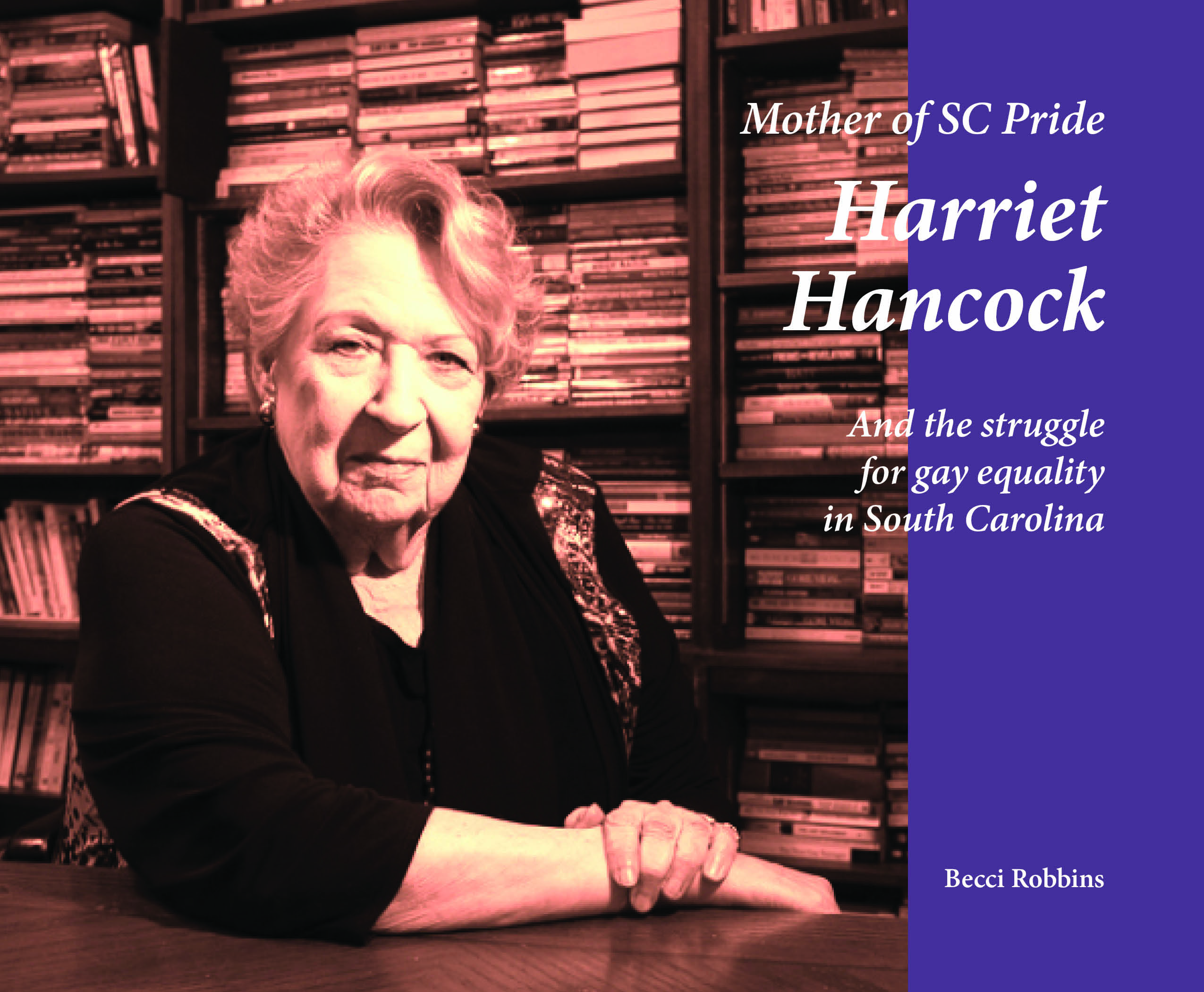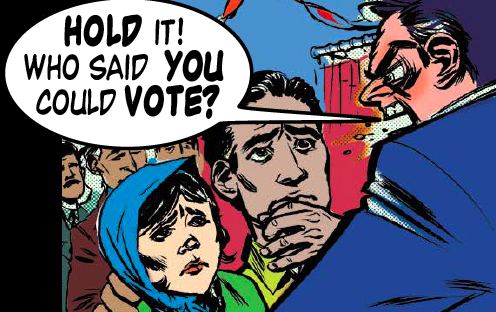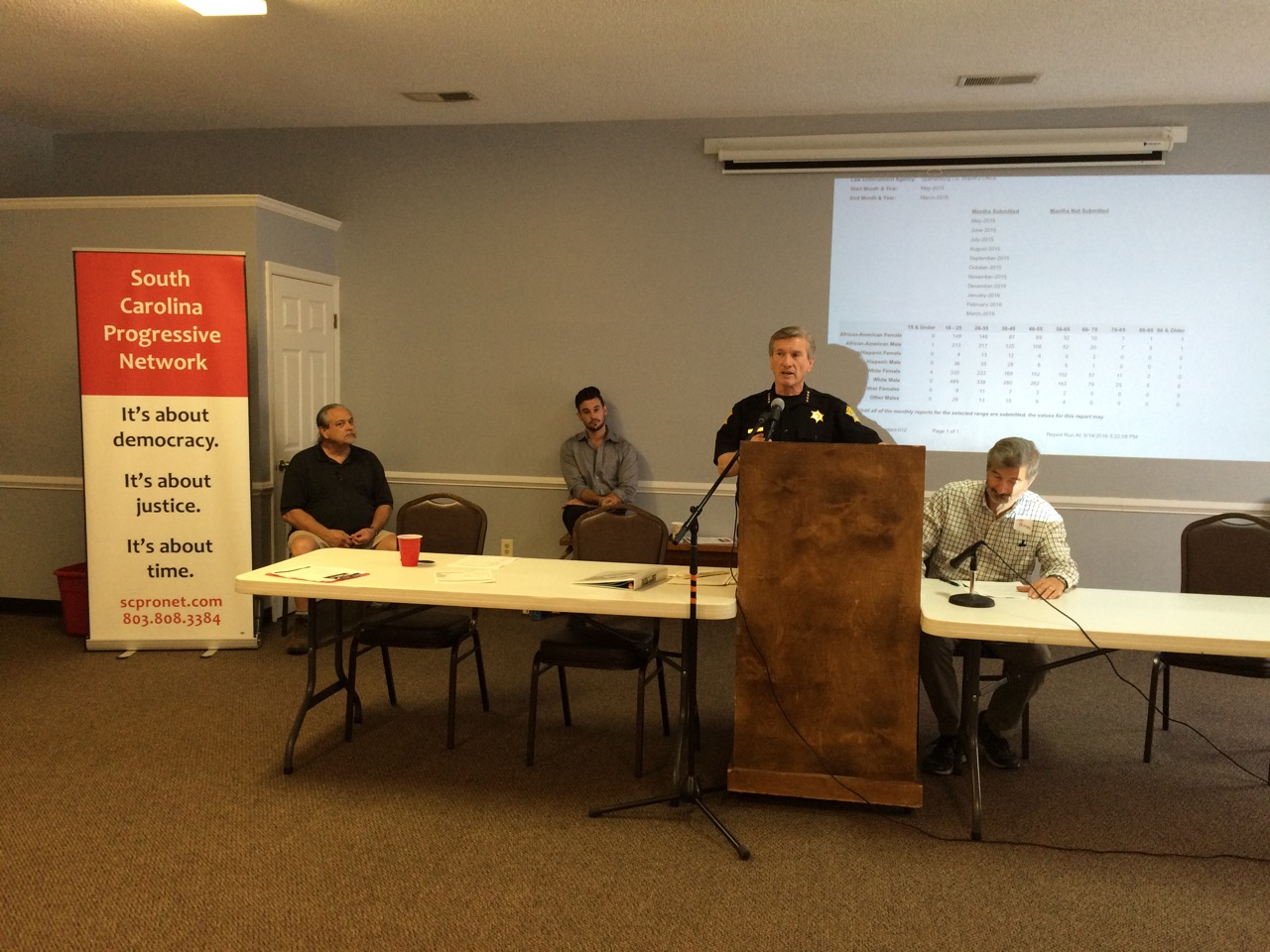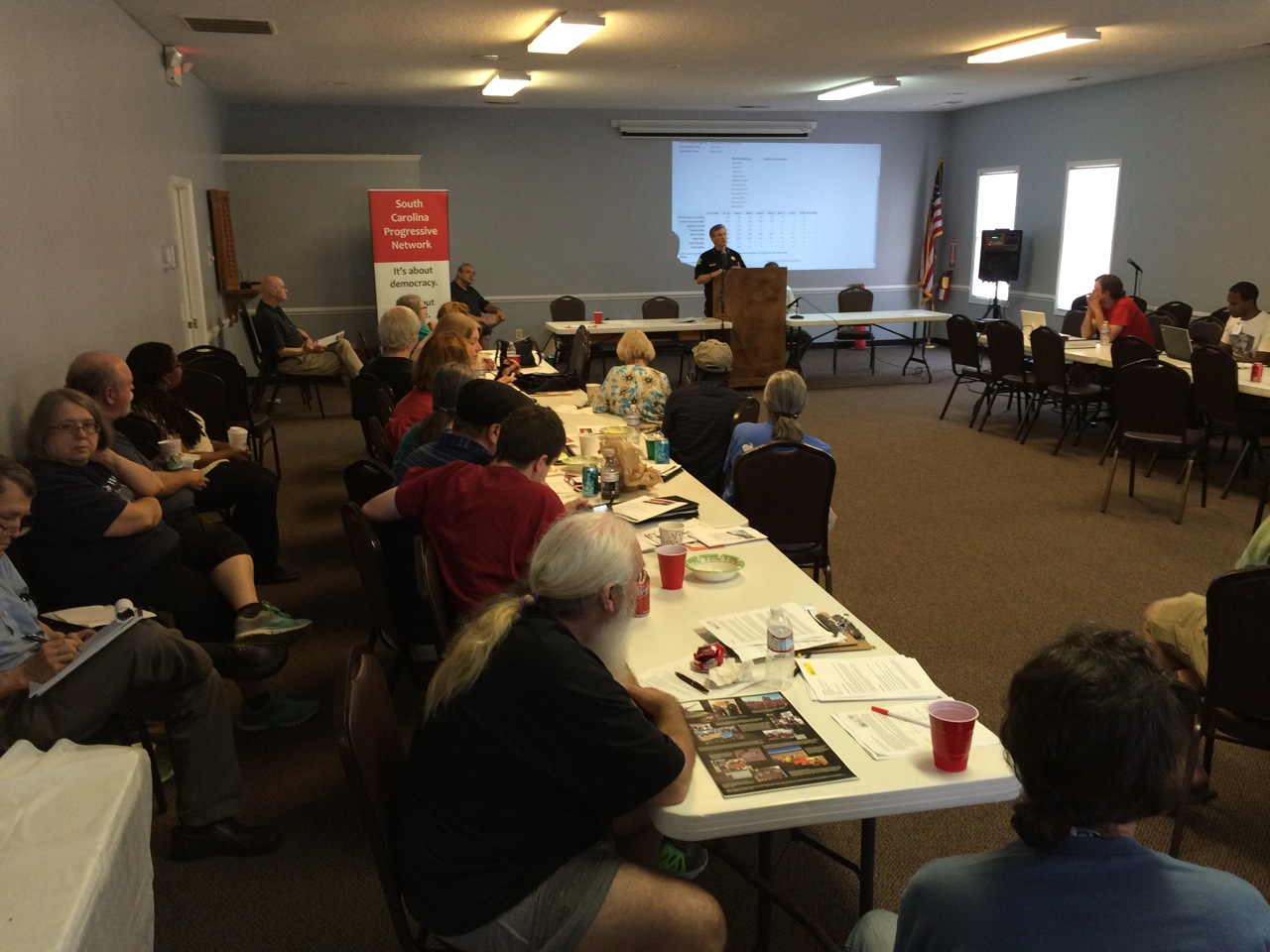Category Archives: Network News/Events
Network offers workshop to help protect the vote in November
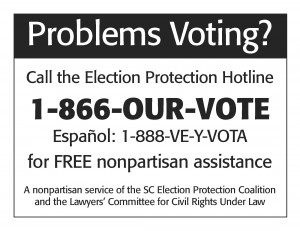 The SC Progressive Network and the National Lawyers Committee will hold an election protection workshop on Sept. 16 to prepare volunteers to monitor the upcoming general election. The Network has worked the past three general elections by responding to calls to the 866-OUR-VOTE hotline.
The SC Progressive Network and the National Lawyers Committee will hold an election protection workshop on Sept. 16 to prepare volunteers to monitor the upcoming general election. The Network has worked the past three general elections by responding to calls to the 866-OUR-VOTE hotline.
While most of the calls were from confused voters, some reported incidents of voter intimidation and efforts at vote suppression. Some calls were referred to SLED or the Justice Department.
We are seeking volunteers for Election day, as well as on the days leading up to it. Volunteers are needed to deliver signs to the county election boards for placement in the precincts, to monitor the operation of the voting computers, and to report problems at the precincts. A South Carolina Legal Manual prepared by the Election Protection Coalition is available to volunteers that answers a wide range of questions.
The workshop on Sept. 16 is to train volunteers to understand the laws governing elections and how to resolve problems. The training is free, and will be held at the Network’s office at 2025 Marion St., downtown Columbia.
For information or to RSVP, contact the Network at 803-808-3384 or network@scpronet.com.
Know your SC herstory? Download booklet profiling legal pioneer Sarah Leverette
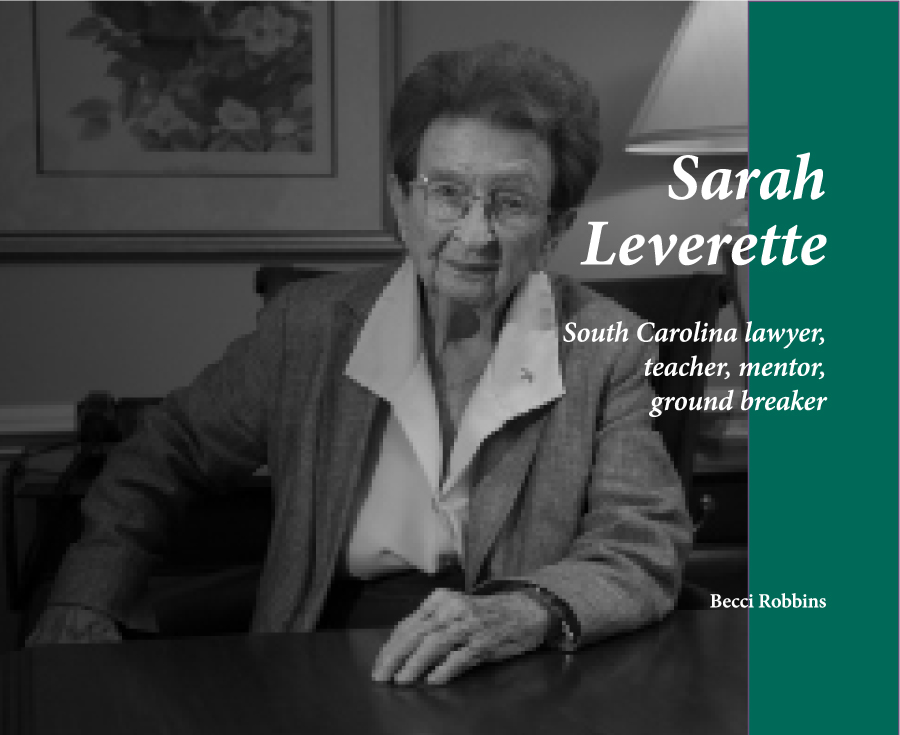 The SC Progressive Network‘s recently published profile of Sarah Leverette, which is being distributed free in select spots in Columbia – including our office at 2025 Marion St. – is now available for free download here.
The SC Progressive Network‘s recently published profile of Sarah Leverette, which is being distributed free in select spots in Columbia – including our office at 2025 Marion St. – is now available for free download here.
The booklet is the final of a set of booklets about three extraordinary South Carolina women: Leverette, human rights activist Modjeska Monteith Simkins, and LGBT advocate Harriet Hancock. The two-year project was made possible by a generous grant from the Richland County Conservation Commission, which shares our belief that history is our greatest teacher.
For information about the booklets, call the Network at 803-808-3384 or email network@scpronet.com.
Sept. 21 is deadline for nominations to fill Network’s executive committee seats
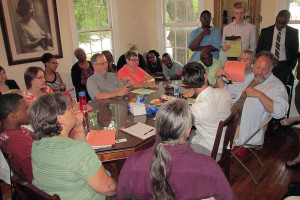 The SC Progressive Network is accepting nominations to fill seats on its C-3 and C-4 executive committees. The Network is soliciting serious, dues-current members to run for office. Elections will be held at our fall conference Oct. 22 in Columbia. Nominations will be accepted until Sept. 21, with names forwarded to our nominating committee for consideration.
The SC Progressive Network is accepting nominations to fill seats on its C-3 and C-4 executive committees. The Network is soliciting serious, dues-current members to run for office. Elections will be held at our fall conference Oct. 22 in Columbia. Nominations will be accepted until Sept. 21, with names forwarded to our nominating committee for consideration.
For details about the Network’s boards, committees and bylaws, see our web site.
To nominate someone, or yourself, send name and short bio to network@scpronet.com, or call 803-808-3384.
Network profiles three extraordinary SC women
In 2014, the SC Progressive Network was awarded a grant from the Richland County Conservation Commission to produce a booklet about Modjeska Monteith Simkins. It was distributed free to readers in the Midlands, and was so well received that the Network ordered a second printing.
Last year, the Network received another grant from the Commission for two additional booklets, on gay rights activist Harriet Hancock and legal pioneer Sarah Leverette. The Hancock booklet came out in May; the Leverette booklet will be released in mid-August.
Becci Robbins, the Network’s communications director and author of the booklets, said of the project, “While I didn’t set out to write a trilogy, the booklets evolved into a package that now seems perfectly timed. Besides telling the stories of three phenomenal South Carolina women, they offer a chance to explore racism, sexism, and homophobia—problems continuing to fester in the nation’s addled psyche.
The booklet about Modjeska, whose grandparents were enslaved, reminds us of South Carolina’s grim past – and how it haunts us still. The booklet about Harriet went to press just days before the massacre in Orlando that left 49 people dead and 53 maimed in a gay nightclub.
And the last booklet about Sarah, who was born on the eve of women’s suffrage in America, comes out as the nation deliberates whether to vote for its first woman president. This historic election has come with the sad reminder in certain news outlets and on social media that misogyny is alive and well.
While the booklets provide no easy answers to the vexing problems we face, they give some historical context to help understand the current social and political climate in America and here at home. And they show the power a single citizen can have, given enough passion and commitment.
My hope is that these booklets will make their way into the hands of girls and young women who will be as moved and impressed as I have been by Modjeska, Harriet, and Sarah. It has been a great privilege to share their stories.”
Questions? Call the Network at 803-808-3384.
Download this booklet to read about Modjeska’s extraordinary life.
Click here to download Harriet Hancock booklet.
The Sarah Leverett booklet is at the printer, and will be available in mid-August.
Federal courts find photo ID laws unconstitutional
The argument the SC Progressive Network has been making about South Carolina’s photo ID law being a Republican plan to suppress the black vote has been taken up by new champions: federal judges across the country!
The 4th Circuit Federal Court of Appeals that struck down the North Carolina photo ID law on July 29 ruled “the demonstrated ingenuity of state and local governments in hobbling minority voting power… imposes cures for problems that didn’t exist.”
Most recently, the three-judge appeals court in Richmond ruled that North Carolina’s photo ID law was unconstitutional. It also voided new NC laws that cut early voting, ended same-day registration and out-of-precinct voting.
Although North Carolina’s “reasonable impediment” ballot for registered voters without a photo ID was modeled after the SC photo ID law, Executive Director of the Southern Coalition for Social Justice Anita Earls advised that the ruling doesn’t automatically apply to South Carolina. Earls has 20 years of experience as a top attorney in the Voting Rights Section of the US Dept. of Justice. The SCEJ has been advising the Network on voting rights laws, and was a party to the North Carolina case.
Responding to the Network’s inquiry about the ruling’s impact on South Carolina, Earls said, “We think that there are some important distinctions among reasonable impediment schemes, and even though the North Carolina provisions were modeled on the South Carolina law, there is no immediate and automatic invalidation of South Carolina’s photo ID requirement as a result of this decision.”
Earls said that what won the fight in North Carolina was the difficulty in getting the free photo ID there. The operation was poorly run by the state DMV, rather than by each county board of elections, as in South Carolina. Opponents of the photo ID law in North Carolina were able to prove that people had a hard time getting the free ID and that many of the impediment ballots were not counted as required by law.
The task before opponents of the South Carolina photo ID law is to gather the data on the impact of the law on the 202,484 registered SC voters who the State Election Commission identified in 2012 as not having a DMV photo ID.
Network Director Brett Bursey recently requested the State Election Commission to provide a tally of how many of the provisional ballots cast in the 2014 election were for lack of photo ID, and how many of those impediment ballots were rejected. “I was told that the state Election Commission did not gather those numbers and I would have to go to each of the 46 counties for that information,” Bursey said. “Without that data, we can’t determine if our photo ID law had the same impact on black voters as it did in North Carolina.”
The Network will be seeking the information needed to determine the law’s impact.
Election update: working a rigged system – and winning!
In keeping with the Network’s analysis that there are few races that aren’t preordained in South Carolina, through gerrymandered districts and other tools that rig the system, SC ProVote, the Network’s C-4, picked two campaigns on which to spend our resources.
In the campaign for Senate District 17 (Fairfield, Chester and York), we supported Mike Fanning, a progressive candidate who we thought had a solid chance at winning. In the other campaign, our mission was to remove the Lee Bright from Senate District 12 (Greenville, Spartanburg) by promoting his Republican opposition.
Mike Fanning speaks to at the Network’s annual fall conference at Penn Center.
We are pleased to report that our preferred candidates won in both races.
Progressive Network member Fanning forced a run-off and beat the longtime Democratic incumbent Creighton Coleman. Network volunteers made hundreds of phone calls and our Rock Hill chapter knocked on many doors in the York County portion of the district. We are thrilled that he will be an ally in the State House.
Sen. Lee Bright, the indefatigable bigot who wages futile battles against civilization, will not be going back to the Senate. Our upstate members made calls to Democrats encouraging them to vote for Spartanburg attorney Scott Talley in the June primary. We know Talley from his time in the House and consider him rational. While we don’t expect Tally to be progressive, we are reminded that there are no permanent friends, or permanent enemies in the legislature, only temporary allies.
Crossover voting in the primary has long been a taboo. But now that political districts have been drawn to insure Republican dominance of the legislature, Democrats in these districts won’t have a say in who represents them unless they vote in the Republican primary. 75% of the 170 legislators are chosen in the primary, so the majority of citizens only have one person to vote for in the general election – like the old Soviet style elections we used to make fun of.
The Network has long argued that we can’t rely on an electoral system that is driven by money and corporate influence to solve our problems. We must take on and sustain, the long, hard task of building a popular movement with the power to make real change.
Network staff part of lawsuit against Turbeville’s long practice of “highway robbery”
SC Progressive Network Director Brett Bursey and Communications Director Becci Robbins have joined in a lawsuit against the town of Turbeville for writing municipal traffic tickets Bursey claims are unconstitutional. He estimates Turbeville has been writing these tickets since 2003 and bringing in about $1 million a year.
Read full story in The State.
Modjeska Simkins School class offers reality check on SC political system
SC Progressive Network Director Brett Bursey leads Modjeska School class discussion on a rigged political system, and how a mass popular movement built on a revolution of social values is the key to meaningful change.
Sheriff Leon Lott says Network’s racial profiling project boosts accountability
Richland County Sheriff Lott shared the progress and challenges on racial profiling in South Carolina at the Network’s spring strategy conference in Columbia.
Brett Bursey, executive director of the SC Progressive Network: Sheriff Lott has been a friend of the people for quite some time now. He participated with Joe Neal and I in television work about racial profiling databases in 2001. And Richland County has taken the lead on that. And the sheriff has taken a little bit of time off from campaigning for his, how many terms?
Richland County Sheriff Leon Lott: Sixth term.
Bursey: For his sixth term, so he’s obviously doing a good job as Richland County sheriff. So let’s hear it for Leon Lott. (applause)
Sheriff Lott: Thank you.
The problem with all that data is nobody really looks at it, half the agencies don’t turn it in, and it’s not enough data. Back in ’99 and 2000 we were looking at racial profiling and being transparent and creating a citizens advisory council. We required that every deputy, when they stop somebody, they have to call in the stop, location where they stopped them, and why they stopped them. And when they get through with the stop, we have to get the age, race and what they did.
So we have the whole picture, and then our dispatcher takes that and – through the computers we’ve got – we have each officer’s name with the data. And we have somebody look at it; it doesn’t sit there like the state’s data. We have supervisors look at it, and we check our officers. Is this officer working in a Latino community? Who is he stopping? Is he in a white community? Is he in an African -American community? We have to look at what community they work in to determine who’s being stopped. Then you have to look and see are they just stopping one race? One sex?
We actually identified an officer who was stopping Hispanic females, and we saw that there was a problem. So we started pulling his tapes and we found out he was profiling Hispanic females, and actually had him on tape assaulting one. We didn’t just terminate him, we arrested him.
What we were doing in 1999 and 2000 had been so successful with us—Rep. Joe Neal and Brett [Bursey] said we need to do statewide. They started off modeling after what we were doing, but by the time [the bill] got passed it was so watered-down it was basically ineffective. One of the most blatant things that made it ineffective was that people weren’t forced to do it. We had so many agencies that just weren’t turning in the information. Why isn’t there some penalty for not doing it? There wasn’t.
So the law really hasn’t been effective. Rep. Joe Neal, a Richland County representative and one of my close friends, we started back again trying to do something to require agencies to do it. And to give us more information. If you’re just doing it for people who get warning tickets, what about people who are stopped and don’t get a warning ticket? Or that you give an actual ticket to? Where’s the data on them?
So we’re not getting the data on everyone who’s stopped, and that’s what we need-not just a snapshot of a few people who are stopped, but everybody that you stop-and then have it examined. You have to look at what you’re doing and why you’re doing it. And when you do that, you’re able to determine if you have racial profiling. That is the only way you’re going to be able to stop it.
We go through the education part of it with our deputies. If they know that we’re not going to tolerate anything like that and that you will be arrested and you will be terminated if they do stuff like that, then they have it in their mind that they can’t do it. But if an agency allows it or doesn’t check, then there’s going to be some officers that are actually going to do it. So you have to start at the agency’s head—the ones who put the word out that this is not going to be tolerated in our agencies.
One of the things we did to help do that was our citizen’s advisory council—27 citizens who represent the diverse community we have in Richland County. We’ve had it for 16 years. They come in and look at all of our internal affairs complaints, all the police shootings, all our policies and procedures, they look at every single thing we do. They have a voice in the sheriff’s department, which is the voice of the citizens of Richland County.
I can’t go around and talk to all 500,000 residents of Richland County, but I can talk to their representatives who represent their community. They see what we do in real live time, not six months later, 10 months, not one year later, but they see it as it happens. If we have a shooting, they’re getting information as soon as I’m getting information so they can take it back to their communities and let communities know what actually happened. They sit on our hiring board.
When you go through to be a deputy, the last thing you do is go before an interview board. There’s five deputies and two representatives from the citizens advisory board, and each one has an equal vote. We want the citizens to see everything we do. The agencies that hide the information are the agencies that are doing something wrong. If you’re not doing anything wrong, there’s absolutely no reason we can’t be open and honest and transparent with every single thing that we do. That’s what we do at Richland County, and I get criticized for it. I get criticized for it by other sheriffs and other chiefs who don’t believe in it. They don’t believe in collecting data on racial profiling. They don’t believe in having a citizen’s advisory council. They’re totally against it.
Sen. [Marlon] Kimpson from Charleston County and Sen. John Scott from Richland County introduced two bills in the current session. One bill was for SLED to have a citizens advisory council. The other bill was for agencies over 300,000 to have a citizen’s advisory council. That got shot down immediately by the Sheriff’s Association and other law enforcement associations because the sheriffs and chiefs said, “We don’t want the citizens to have oversight of what we’re doing.”
That to me is absolutely ludicrous and crazy, and I’m ostracized by my fellow sheriffs because I believe in that. I ain’t changing. I’m not.
Three years ago, I was elected to be president of the South Carolina Sheriff’s Association, and I was to take office this July, so I would have been president in ’15 and ’16. After Sen. Kimpson introduced the bill on citizen’s advisory councils, the Sheriff’s Association had a special meeting where they voted me out. They didn’t believe in what I was doing and what I was saying. So I’m not going to be the president, so I can’t help you out on there. But I am going to be your voice and will speak out loud and clear and publicly that we need to do something about the problem in our communities with our law enforcement doing the wrong thing. And we need the citizens to help us police the police. That’s what we need to do. And when we do the right thing, we don’t have to worry about it. And by working together, we can do that.
The racial profiling bill is not going to go anywhere this year. Hopefully by next year we will be able to strengthen it and make it effective like it needs to be. But what you’re doing [through the Network’s racial profiling project] is a start, because if it wasn’t for you, we wouldn’t have anything. We’re doing what we’re doing because it’s the right thing to do. But without you, we weren’t going to Spartanburg, we weren’t going to Greenville, we weren’t going to these other agencies and asking them the hard questions.
So keep doing what you’re doing, because the good cops don’t mind it one bit. Thank you.
•••
This May 14 speech was transcribed by SC Progressive Network Member Liaison Kyle Criminger and has been edited for length.

